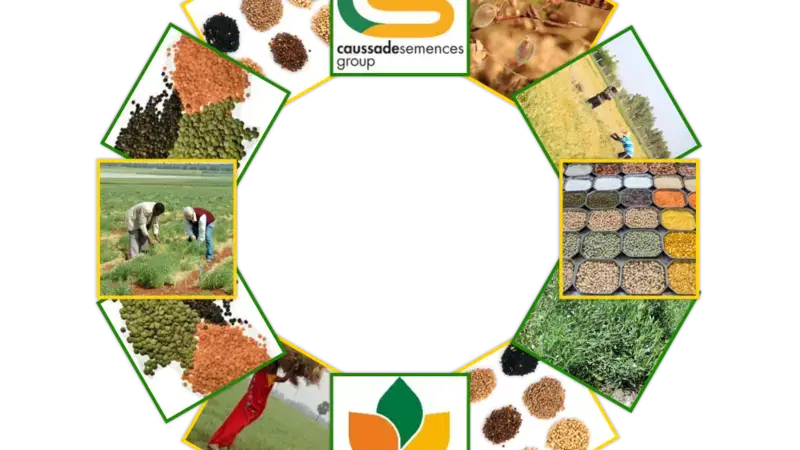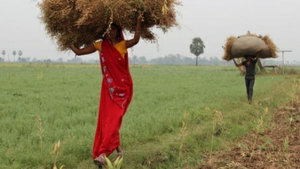Collaboration between ICARDA and Caussade Semences Group (France)

The collaboration between ICARDA and Caussade Semences Group (France) will support the further development of their respective plant breeding programs, especially for kabuli chickpea, lentil and grass pea.
ICARDA entered into this agreement for the further improvement of its plant breeding and crop improvement capacities in furtherance of the CGIAR vision of reducing hunger, improving human health and nutrition and enhancing resilience through high-quality international agricultural research, partnership and leadership. The collaboration will allow Caussade and its subsidiaries to produce new crosses for the commercialization of kabuli chickpea, lentil and grass pea in Europe.
Caussade has the benefit of exclusivity within the European Union, for five years, with respect to nearly 200 chickpea lines, nearly 100 lentil lines and one grass pea line. ICARDA breeding material for these crops to be used for the purpose of research, breeding and training for food and agriculture. Consistent with the CGIAR Principles for the Management of Intellectual Assets [with link], those same materials will continue to be made available within the European Union for non-commercial research by public sector organizations and in case of food security emergencies. Furthermore, these materials will continue to be available without restrictions outside of the European Union for research, breeding and training, including for commercial purposes.
ICARDA’s system of crossbreeding, genotypic and phenotypic characterization, selection and dissemination of genotypes on lentils and kabuli chickpeas (mainly based in Lebanon, Morocco and India) is unique in the world. Most of the chickpea varieties registered or in the process of being listed in the catalogues of European countries come from the breeding material distributed by ICARDA (known as International Nurseries), but without the benefit of collaborative research agreements such as this one with Caussade.
Caussade’s experimental station in the south of France extends ICARDA’s research capacity to test grain legumes in Mediterranean non-irrigated conditions that are similar to some parts of Central Asia
Grain and forage legumes (including kabuli chickpea, lentil and grass pea) account for 27% of the world’s primary crop production, with grain legumes alone contributing 33% of the dietary protein nitrogen (N) needs of humans. Concerns about ecological impacts of meat production, ethical concerns in terms of animal welfare, and considerations for human health have promoted an interest in a more sustainable plant-based food production, with legumes as a substantial contributor. Legumes also provide more protein, micronutrients, and other bioactive compounds than cereals. The role of legumes in alleviating the ‘hidden hunger’ caused by micronutrient deficiencies, which are widely prevalent among two billion people, mainly in South Asia and Sub-Saharan Africa, has been recognized. There is a drive to increase consumption of legumes in these part of the world as part of a healthy diet to improve cardiometabolic health, as legumes may reduce cholesterol, support weight management via glycaemic responses, and aid digestive health.
Improvement in legume crop yields have not kept pace with those of cereals. In part, this difference is due to the unfavorable environmental conditions under which many legume species are generally grown in rotation with cereals like corn and wheat. Legumes are mainly grown as a subsistence crop with limited production inputs. As a result, these crops face many biotic and abiotic stresses at different crop stages.
Drought problems for legumes are likely to worsen with the projected rapid expansion of water-stressed areas of the world. The more drought-tolerant legumes, such as chickpea, lentil and grass pea, are deep rooted and may have reduced leaf size with thickened cuticles to reduce water loss. Lack of mechanical harvesting technology and the increasing menace of weeds make the production of legumes expensive, in many less developed agricultural systems, hand harvest of legumes is still common.
This agreement with Caussade underscores ICARDA’s readiness for technical exchanges with the private sector which is not limited to sharing genetic material. Knowledge and methods on legume crop improvements and value chains can be shared between Europe and the southern Mediterranean countries through the organization of technical and scientific seminars making it possible to set up more regular and informal exchanges; expert cross visits; co-supervision of PhD and master students on the agroecology of legumes; and the development of a shared experimentation network on the contribution of legumes to sustainability and the adaptation of cropping systems to climate change.
The food industry is looking for innovation with legumes on both sides of the Mediterranean basin. In France and in many countries of Europe there are strong national and international initiatives to promote crop diversification especially with legumes as a driver of a climate smart and nutrition sensitive agriculture. An additional strong incentive is the European Green Deal. Europe is to become the world’s first climate-neutral continent by 2050, with an ambitious package of measures that should enable European citizens and businesses to benefit from sustainable green transition.
The collaboration between ICARDA and Caussade is an opportunity to share expertise and knowledge on legumes in agri-food systems for the mutual benefit of Europe and the MENA region.
The potential for win-win situations, such as this one with Caussade, is high with the South having (still) a significant research investment on the “Genome to field” aspect of these crops (gene banks, plant breeding, agronomy and crop protection) and the North starting to invest in the “plate to health” aspect (nutrition and health, food processes, food systems). The evaluation data provided to ICARDA feeds directly into its research and breeding programs for the benefits of the poor in drylands.
The breeding materials that are subject to this agreement are derived from materials accessed from the international in trust collection maintained by ICARDA under the framework of the multilateral system of the International Treaty on Plant Genetic Resources for Food and Agriculture. As intermediary products to be used for further research and breeding, ICARDA is transferring them to Caussade under the SMTA as PGRFA under Development, with additional terms and conditions as described herein. Caussade is therefore bound by the benefit sharing terms of the SMTA.


